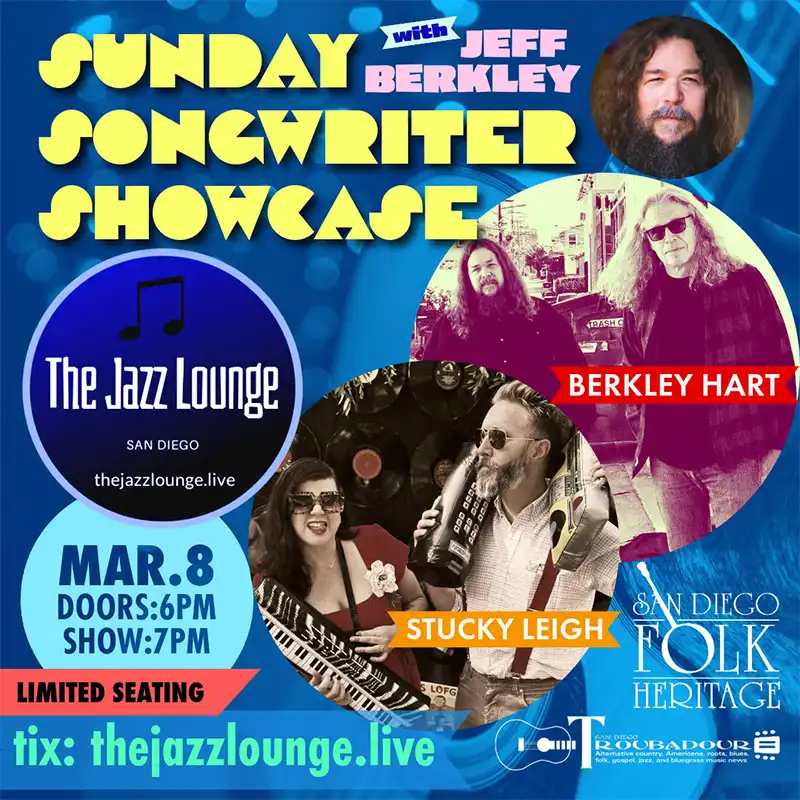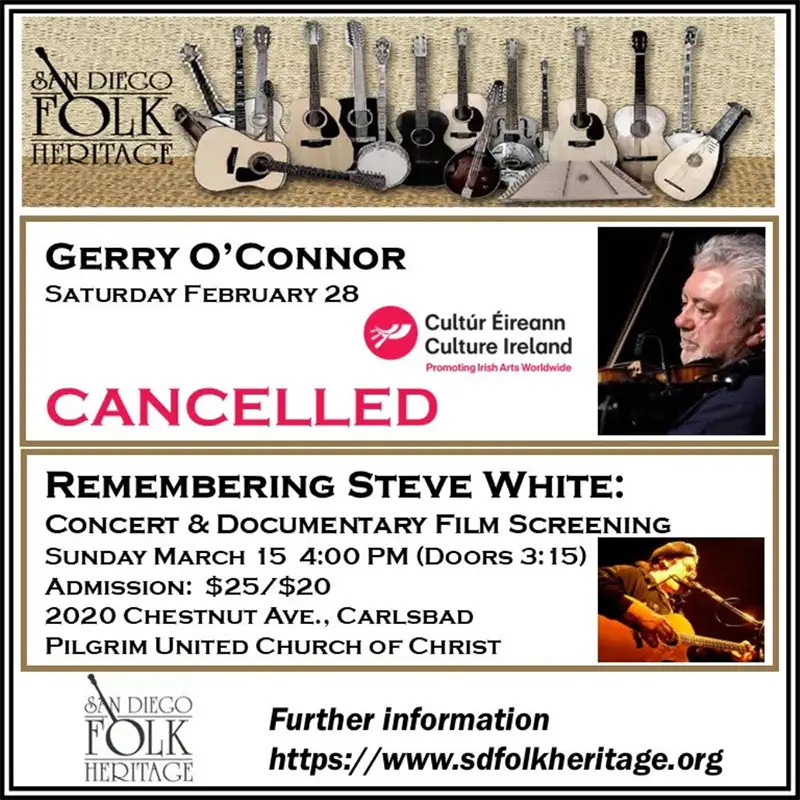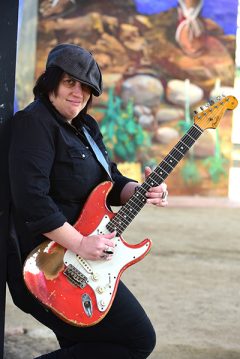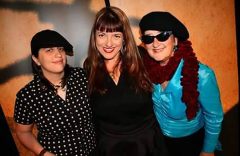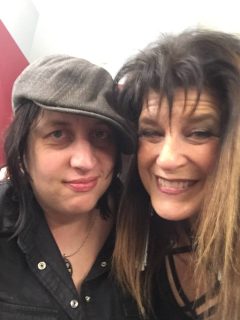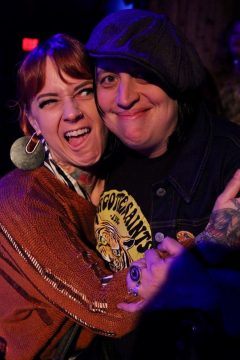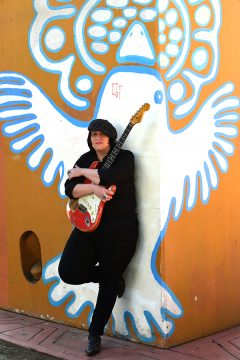Cover Story
LAURA CHAVEZ: A Force of Nature
Laura Chavez is hard to pin down. For one thing, she’s never home. Her unrelenting tour schedule includes multiple bursts into Europe with the Nikki Hill band, followed by a variety of dates with Vanessa Collier up and down the eastern seaboard. A few more weeks back in Europe for the Blues Caravan tour then back on a plane. Add recording stops in New Orleans and a few festival gigs across North America before she finally heads to the West Coast. Upon arrival in Southern California she’s immediately in demand for more studio and performance dates with her multi-talented friends Casey Hensley, Anthony Gomes, Whitney Shay, Sue Palmer, Lindsay Beaver, and, again, Nikki Hill.
The woman is in a state of perpetual motion, so it seemed appropriate to ask, where does she find the energy? “I don’t know,” She says, shaking her head. “It’s just what I know. I don’t like to just sit around. I don’t know if I’m just restless or what! I’ll have a night where I’m just gonna stay home, sit here and relax ,and watch Netflix… and I can’t do it! I’ll look whose playing and what can I do? [laughing] “I like to be busy!”
We finally had the chance to sit and talk prior to a record release party at the Thunderbird Analog Recording Studios in Oceanside. And it started with how she describes her own music. “That’s a tough one.” She laughs. “It’s really all realms of any roots-based music. I tend to gravitate toward the more melodic, but that ranges from blues and soul to rock ‘n’ roll and country, anything that has melodic lines. I find a way to incorporate that in whatever I’m playing. I had all these things I grew up listening to–xlassic rock, old aoul music, punk rock, and eventually traditional blues but Candye [Kane] opened me up to a lot of the old big band swing, all the great vocalists… and country. Since then I’ve always liked the challenge of playing something people don’t expect me to play.”
You like the discovery process? “I do, yeah!” She smiles. “I’m always up for the challenge. A lot of times people will say, ‘I didn’t expect to hear you with so and so… but when I heard it, I knew it was you!’ So I guess I have a style, or it seems that people are able to recognize when it’s me playing, whether that’s by the tone or what, I don’t know. But I think that’s what we should all strive for and that’s always the biggest compliment when I hear that.”
Fill us in on your background. “I grew up in Mountain View, California, in the Bay Area, and I went to school there. I didn’t start playing out until I graduated from high school. All my family is in Northern California.”
Was your family musical? “Not particularly. Before I was born, my grandpa tried to play lap steel and was into old country music, and my grandma was into country and swing; she loved old vocalists like Kay Starr and Hank Williams. Their music collection was my first introduction to that. My parents listened to music and mom played piano; she liked to sight read and play along to songbooks. But I don’t think they would be considered musical. They always had music on in the car; my earliest memories are riding in the car and listening to music. My older brother got me into classic rock when I was younger, my earliest memories of that are from five, six, or seven. He was bringing home Led Zeppelin, Doors, and stuff like that. Then he got into hip hop and rap and it was at the time West Coast rap was sampling a lot of old soul music, like the Isley Brothers and I got into all of that. And I remember all of it. I’ve never set any of it aside, ever. I was just drawn to all of it.”
Has it always been the guitar? “I took piano lessons when I was younger. I don’t know if my parents remember this, but I really wanted to learn how to play the violin, it was very short-lived, but I was drawn to the violin. I took piano lessons and my piano teacher,–I don’t know if she died or retired–I was like, five or six and I moved to another piano teacher who was a young, concert-trained pianist from Juilliard, and she decided we were all going to be concert-trained pianists’ from Juilliard… at five or six. Strict and regimented, it didn’t go very well. But then I took classical guitar lessons; my parents signed me up in the third grade through the school. And the teacher… well, it was not a good experience. I actually used to hide from my lessons that my parents were paying for. I would hide from the teacher.” [laughing]
That was then, this is now. The 40th Blues Music Award nominations have been announced and Laura’s name is at the top of the instrumental guitarist category. “I woke up to a bunch of text messages congratulating me on the nomination.” Laura says. “Being on the West Coast we’re usually the last to find out about things! I was surprised. In years past I would wake up to a bunch of text messages telling me how much people felt I deserved it and how maybe next year… so, it was a nice surprise this year.”
Tell us about Greg Vaughn and Drapers in Palo Alto? “When I was 12 or 13, I was able to pick up a guitar again. My parents got me an electric guitar and I started taking lessons from Greg. I’m so grateful because he opened the door for me. I ended up taking over for some of the beginner students he was getting and I ended up teaching. He was the link to the electric guitar and helped me see that it was possible to do what I wanted to do. He definitely taught me how to play the Guns and Roses and Zeppelin stuff.
Do you still teach? “I do. Before I started touring with Candye I had a fleet of students up in the Bay Area. I was teaching 30 a week, but when you tour it is very difficult to keep up with. Now, I have a few I teach here in San Diego and I’m always open to new students. You know Benji Davis? He’s one of my students and so is Reagan Williams. He’s an up-and-coming guitar player and he’s got good things ahead of him, too.”
When did you migrate toward the blues? “In high school I started to listen to it a lot more. That’s when I learned the whole concept of improvisation. How I can insert my own personality into music. When I graduated high school I started going to these blues jams. That was my first experience playing in front of anybody, a chance to play with a band and find people to play with.”
How did you run into Lara Price? “I met Lara at the very first blues jam I went to; it was one she was running. There’s this little dive bar across the street from the Guitar Center in San Jose. It’s called JJ’s Blues. It’s a divey, little narrow, shotgun blues bar where Albert King has played–Albert Collins and Koko Taylor and Buddy Guy. I begged my parents to take me; I was 18 and wasn’t supposed to be in there. I wanted to see… I had no idea if I was good or not, I had no idea if I was good enough to play with these people. I went in and sat by the door, I definitely wasn’t supposed to be in there. I believe I was asked to leave at some point because I wasn’t playing. I didn’t bring my guitar. So the next week I went back and played, and that was the beginning. I went back every week. After all that I ended up becoming the guitarist for the house band at the jam and played with Lara for eight years. We did a couple of cross-country tours, and the IBC once. We did two albums together, three actually; we had an acoustic duo album… that was during my early years.”
Your formative years? “That was my first experience playing in a band, my first experience collaborating and writing music with somebody, and my first experience recording.”
Is it true that Candye Kane actually hired you without hearing you play? [laughing] “Yeah! That is true.” And this somehow involved Sue Foley? “I’d known Sue Foley for a couple of years,” Laura says. “She was writing a book called Guitar Woman. And she had an album out called Blues Guitar Women. She ended up using a track I recorded with Lara. It ended up being the first song on the album and no one had even heard of me before. It was definitely the first time people outside of California got to hear me. And Sue has always been very good to me. She and Candye were both on the same label–RUF Records–and she told her, ‘Laura lives out in California and I think she would be great for your band, I think you’d really like her.’ Sue and Candye had known each other for years and years. They were on Antone’s and toured together. Candye always said that Sue was her favorite guitar player of all time. So on that recommendation, she hired me. It’s funny because I went down to San Diego and Candye picked me up at the airport. I’ve got a shirt with skeleton on it and she had something with a skeleton and she goes, ‘Oh, I like you because you look like a punk rock blues girl!’ We went out to eat and ordered the same thing and realized we listen to all the same music. Right off the bat we got along so well.”
You did three albums with Candye. “It was a great experience. I wanted to work on original music and always wanted to collaborate with somebody. She said she was always looking for people to collaborate with and never had anybody who was that interested. Immediately, we started writing songs for Super Hero. Right after the Blues Caravan Tour she was diagnosed with cancer, so there was this uncertainty while she was working on these songs; I was still there and she got through the surgery and right afterward we recorded it in L.A.…Hollywood. My favorite part was that collaboration and I ended up co-producing all three of those with her. The second two, Sister Vagabond and Comin’ Out Swingin’ were recorded with Thomas Yearsley at Thunderbird, the original Thunderbird Studios. That allowed us more time to work out songs.”
One of the most poignant moments I’ve witnessed in the local music scene occurred during Gator by the Bay when you were scheduled to play, and the festival learned of Candye’s passing. “I’d spent every night those last five months at the hospital in L.A. with her. It was very difficult and I think we all knew…that if it was her gig, she’d be there.”
The fact that you took the stage and played, for me, was very cathartic, considering the amount of tears and emotion I witnessed, for the festival crowd as well. “I don’t know. I was dazed, and it’s interesting that you bring this up because I hadn’t thought of that particular moment. So many times people who didn’t know her had counted her out, and it was so easy for people to say, ‘Well, it couldn’t have been a surprise?’ Well, it was, because so many times she’d fought back and had come back.”
************
Reaching out to Laura’s friends and fellow musicians for insight… we talked with former Candye Kane bassist Kennan Shaw. “Laura and I met sometime in the early 2000s,” Shaw said. “We ended up on the same pickup gigs. She’d come in, maybe say four words, and play great. Laura is the smartest musician I’ve ever worked with, and her intelligence and amazing memory together create a sum greater than its parts.”
To prove his point, Kennan shares. “I heard her listening to a great guitarist in the van on the way to the next gig and then play those licks that night, but turned inside out or in a different place within the solo that somehow lifted the music to a higher place… and all with emotion and purpose. There were times when I’d have to tell myself to remember to keep playing, rather than just listening.”
************
Looking forward, are there any plans for a solo project? “I don’t know. Everybody always asks me.” Laura just grins. “Now it’s been so long, I have to be sure it’s what I want it to be. I play with this idea of an organ trio and think I’d like to do kind of a mix between soul, jazz, and groovy blues stuff. Like early Albert Collins…”
Do you like writing? “I do, I’ve always loved to collaborate with other people, but I feel that it’s a rare thing for a guitar player to really find themselves in backing up other people and that their role is to make other people sound as great as they can. And that’s what I feel my purpose is right now. Maybe that’s why so many people want to hire me. I’m doing what’s right for the music. I always take my spot up front when it’s my moment, but I step back and like making them sound better. So, I’m comfortable and fine with the idea that I don’t have something with my name on it.”
Let me ask you about some other friends and players… Chris Cain. “Anyone who grew up in San Jose or that area, I mean he’s been a huge influence on all of us. He’s so inspiring, he’s one of a very few who when he plays it’s like coming from somewhere else, through him. Like Stevie Ray Vaughan, the music just flows through him. And he’s good at everything he plays, he plays the organ, he plays the saxophone… I heard a story he got locked in a room with a clarinet and he came out playing bebop licks.”
Nikki and Matt Hill. “I met Matt on the very first cross-country tour I did with Candye, back in 2008,” Chavez remembers. “He was living in Greensboro, N.C., and he came out and we hung out for a minute. I think at that time, anybody under 40 that was into this music, we all kind of knew each other and gravitated toward each other. Then he and Nikki got married, and we’ve been friends all that time and always kept in touch. When they needed another guitar player, it was perfect timing. If it had happened any earlier it probably wouldn’t have worked and I really wanted to do it.” [laughing] And when she asked me, it happened at the right moment. It’s been amazing, and I have so much respect for her and everything she does. If you think I have a lot of energy… and you’ve seen what she does on stage and she’s responsible for all the business, I mean she does not stop working, ever! She’s driven.”
Guitarist Matt Hill remembers that first encounter with Laura. “I instantly loved her playing and tone and she’s always been a really fun hang, so yeah, we hit it off,” he says. “There aren’t many players in our generation that are into the same things so when you find each other, you cling together.”
And now the Nikki Hill band features two guitars. “It was something that Nikki had wanted to do for awhile,” Matt says. “And I was all about it, too. The minute she got off the phone she just turned to me and said, ‘Laura!’ Sounded like a genius idea to me! I’ve always preferred having two guitars in a band. The interplay is much more fun and interesting than doing it all yourself. We have lots of fun together–everyone in this lineup is all about having fun on and off the stage.”
************
How did you come to know Monster Mike Welsh and Mike Ledbetter? “If I could sound like anyone,” Laura says. “I’ve always been a fan of Mike Welsh. He’s so soulful, he’ll make you cry. And Mike Ledbetter, we’ve been really good friends for five or six years. Like when I mentioned Matt Hill, all the young people kind of gravitated together and I met him [Ledbetter] in Memphis and we just started talking. He told me I was one of his favorite guitar players and if he ever started something, he wanted me to be a part of it. He’s just amazing on stage; his voice has so much passion and soul. Originally, for the Monster Mike-Ledbetter thing, I was going to be a part of it kind of permanently but a number of things happened and I ended up playing with Nikki. They ended up putting this album out and I was going to record with them but I ended up doing some overdubs here and it ended up winning a bunch of awards and it’s been very successful for them.”
Will there be an encore? “This past summer, I finally got to sit in with them. We were both on the same festival in Minnesota and I sat in for a few songs. Hopefully, if our schedules align at some point, some time, somewhere we’re gonna’ do shows together and I’ll get to sit in with them again.”
(Author’s note: At the time of this writing we received word about the untimely passing of Laura’s friend and fellow musician, Mike Ledbetter. Their work together on Welsh–Ledbetter’s Right Place, Right Time, produced the Best Traditional Blues Album at the 2018 Blues Music Awards.) “Mike Ledbetter,” Laura says. “In addition to being one of the most exciting things to happen to blues and roots music in years he was also one of my closest friends. We had plans to play in projects together in the future and I was so happy to be a part of his last album. It is a devastating loss for so many reasons but none worse than the loss of my friend.”
Let’s talk about your work with Vanessa Collier… “Again, I try to keep things as diverse as possible.” [laughing] “She’s more soul-funk-jazzy and way more educated and musical than me. Right after Candye passed away, Thomas from the record label asked if I would be the guitar player for the next Blues Caravan for all the artists and I met Vanessa on that. I do a lot of work with Thomas on Ruf Records and when someone is not a guitar player, I play on almost all the albums. I’ve done Vanessa’s album with a girl from Finland, Ina Forsman, who’s fantastic. I just did a project with a great singer, Big Daddy Wilson… but about Vanessa. I ended up recording on her last album and now, when I’m available, I’ll do some tour dates with her when it works out, and it’s a lot of fun. I think she’s scheduled to come out to California in the next year.”
You’ve had many opportunities, who would you really like to play with down the road? “I’d love to get a chance to play a song with Jimmie Vaughan. Oh, and here’s an odd one. I’ve always had this quiet dream to play a gig with Chaka Khan. Rufus is one of my favorite bands.” [laughing] “That’s one people won’t expect.”
Do you still pick up the guitar and play when you’re home? “Over the last few years I haven’t, I’ve been traveling… and I just moved to San Diego about a year ago. Before that I was living in the Bay Area but spending time down here. Traveling, sleeping on people’s couches and guest rooms, and doing that up and down from the Bay Area. Now I have this space and I have a guitar on the wall and I’ll pick it up and noodle around while I’m doing something. I was never one to just sit down and work on this… now! In general, while I’m doing something, like watching TV, I’ll just try to come up with something catchy, a riff or chord progression and work on it and hope it sticks.”
Last words… “I want to follow up,” Laura says. “On what Taryn Donath said in her Troubadour interview in December. She said she wanted everyone to go out and listen to music. I want everyone to go out and listen to music, and I want them to put their cell phone videos down and enjoy the moment. Live music is for the people that are there… in the moment. Art is fleeting and that experience is for the people that are there. Enjoy it.”





